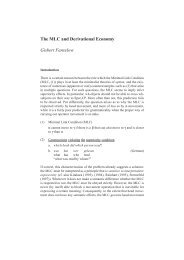Malagasy Adverbs Andrea Rackowski McGill University August 1996
Malagasy Adverbs Andrea Rackowski McGill University August 1996
Malagasy Adverbs Andrea Rackowski McGill University August 1996
You also want an ePaper? Increase the reach of your titles
YUMPU automatically turns print PDFs into web optimized ePapers that Google loves.
In The Structure of <strong>Malagasy</strong>, Volume II , ed. Ileana Paul, UCLA Working Papers in Linguistics, 1998.<br />
The second option has the advantage of explaining the invariant position of the<br />
subject in the sentence. It does not have the freedom of inserting its AgrP in several<br />
different places (as the object does), so the subject always appears in the same position<br />
(last). This choice is not optimal, however, because it requires that Agr sP and Agr oP<br />
behave very differently in terms of generation, which seems strange since they are similar<br />
categories with similar functions. To keep object and subject agreement more constant,<br />
therefore, it is preferable to have Agr sP insert itself in the tree like Agr oP does (as long as<br />
it maintains the additional restriction of inserting in only one position rather than several).<br />
It is also invisible to movement like Agr oP, since it is similarly non-content-full.<br />
When the subject raises directly to [Spec,AgrP], it does so over several<br />
intervening Specs, which should be ruled out by Relativized Minimality. These Specs,<br />
however, contain AdvPs which appear to be invisible to operations that involve different<br />
types of elements. The subject is raising to an A-position, while the adverb Specs may be<br />
either A’ positions, or even a third type of position - an Adverb position - which makes<br />
them invisible to movement of other types according to Relativized Minimality. If the<br />
Specs of AdvPs are A’ positions, or some third kind of invisible category, then the<br />
subject cannot raise to them on its way to an A position, [Spec,AgrP], and is in fact blind<br />
to them so that raising over these positions causes no violation of Relativized Minimality.<br />
This explains the grammaticality of the subject skipping over supposed potential landing<br />
sites in its movement from [Spec,VP] to [Spec,Agr sP].<br />
The phenomenon of adverb invisibility to other types of raising has been argued<br />
previously for <strong>Malagasy</strong> in Pensalfini (1995), who places ‘particles’ (adverbs here) in an<br />
A’ position ([Spec,MoodP]) to explain the grammaticality of sentences in which elements<br />
have raised across Spec positions. A similar account is also proposed for Basque in Laka<br />
(1990).<br />
Like the object, the subject may raise out of the VP at any point in the derivation,<br />
because, during VP and adverb movement, it is never dominated by a category that could<br />
serve as a barrier. Also like the object, once the subject inserts its AgrP and raises to it,<br />
that phrase is invisible to movement, and so forces the category below it to move instead.<br />
This similarity of behaviour with respect to AgrPs lends further support to the idea that<br />
non-content-full categories are irrelevant to operations of content-full categories like<br />
AdvPs.<br />
Subject raising is shown in (61) and (62).<br />
(61)<br />
naP<br />
2<br />
na(dia) azaP<br />
2<br />
: 2<br />
| aza veP<br />
| 2<br />
| 2<br />
| ve TP/AgrS-P<br />
| 2<br />
| NPsubj 2<br />
z------------- FP<br />
21
















